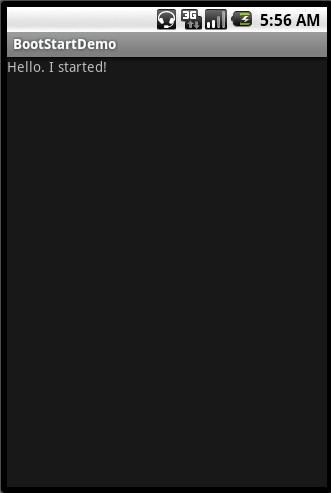Android实现开机自动运行程序
有些时候,应用需要在开机时就自动运行,例如某个自动从网上更新内容的后台service。怎样实现开机自动运行的应用?在撰写本文时,联想到高焕堂先生以“Don't call me, I'll call you back!”总结Android框架,真是说到点子上了。理解这句话的含义,许多有关Android平台上实现某种功能的问题,都能迎刃而解。
使用场景:手机开机后,自动运行程序,在屏幕上显示"Hello. I started!"字样。
背景知识:当Android启动时,会发出一个系统广播,内容为ACTION_BOOT_COMPLETED,它的字符串常量表示为android.intent.action.BOOT_COMPLETED。只要在程序中“捕捉”到这个消息,再启动之即可。记住,Android框架说:Don't call me, I'll call you back。我们要做的是做好接收这个消息的准备,而实现的手段就是实现一个BroadcastReceiver。
代码解析:
1、界面Activity:SayHello.java
package com.ghstudio.BootStartDemo;
import android.app.Activity;
import android.os.Bundle;
import android.widget.TextView;
public class SayHello extends Activity {
@Override
public void onCreate(Bundle savedInstanceState) {
super.onCreate(savedInstanceState);
TextView tv = new TextView(this);
tv.setText("Hello. I started!");
setContentView(tv);
}
}
这段代码很简单,当Activity启动时,创建一个TextView,用它显示"Hello. I started!"字样。
2、接收广播消息:BootBroadcastReceiver.java
package com.ghstudio.BootStartDemo;
import android.content.BroadcastReceiver;
import android.content.Context;
import android.content.Intent;
public class BootBroadcastReceiver extends BroadcastReceiver {
static final String ACTION = "android.intent.action.BOOT_COMPLETED";
@Override
public void onReceive(Context context, Intent intent) {
if (intent.getAction().equals(ACTION)){
Intent sayHelloIntent=new Intent(context,SayHello.class);
sayHelloIntent.addFlags(Intent.FLAG_ACTIVITY_NEW_TASK);
context.startActivity(sayHelloIntent);
}
}
}
该类派生自BroadcastReceiver,覆载方法onReceive中,检测接收到的Intent是否符合BOOT_COMPLETED,如果符合,则启动SayHello那个Activity。
3、配置文件:AndroidManifest.xml
<?xml version="1.0" encoding="utf-8"?>
<manifest xmlns:android="http://schemas.android.com/apk/res/android"
package="com.ghstudio.BootStartDemo"
android:versionCode="1"
android:versionName="1.0">
<application android:icon="@drawable/icon" android:label="@string/app_name">
<activity android:name=".SayHello"
android:label="@string/app_name">
<intent-filter>
<action android:name="android.intent.action.MAIN" />
<category android:name="android.intent.category.LAUNCHER" />
</intent-filter>
</activity>
<receiver android:name=".BootBroadcastReceiver">
<intent-filter>
<action android:name="android.intent.action.BOOT_COMPLETED" />
</intent-filter>
</receiver>
</application>
<uses-sdk android:minSdkVersion="3" />
<uses-permission android:name="android.permission.RECEIVE_BOOT_COMPLETED"></uses-permission>
</manifest>
注意其中粗体字那一部分,该节点向系统注册了一个receiver,子节点intent-filter表示接收android.intent.action.BOOT_COMPLETED消息。不要忘记配置android.permission.RECEIVE_BOOT_COMPLETED权限。
完成后,编译出apk包,安装到模拟器或手机中。关机,重新开机。
运行截图:
延伸思考:在多数情况下,要自动运行的不是有界面的程序,而是在后台运行的service。此时,就要用startService来启动相应的service了。
